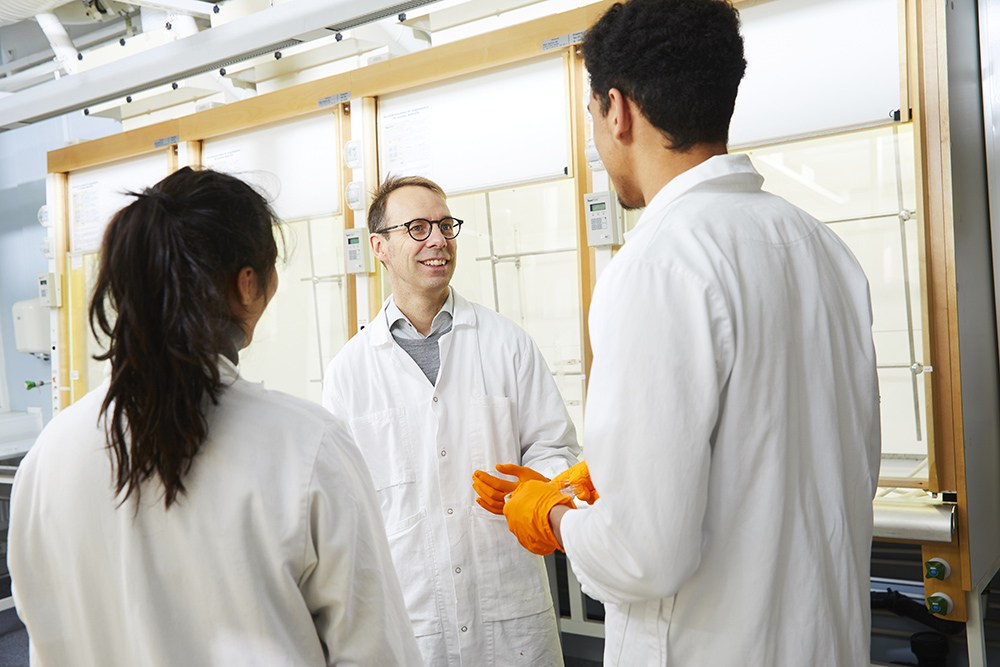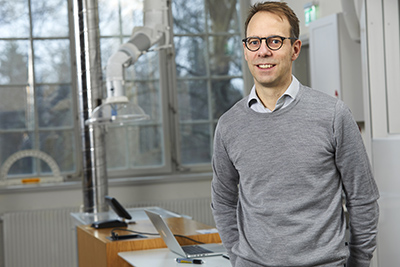
He receives the prize for green laboratory courses
Peter Dinér, Associate Professor of Chemistry at the School of Engineering Sciences in Chemistry, Biotechnology and Health (CBH) is the recipient of the KTH’s Pedagogical Prize 2019. He is receiving the award, among other things, for having included and integrated the concept of “green chemistry” and sustainable development into the laboratory course components. This work has also resulted in scientific publications in education journals.
Peter Dinér on being awarded the KTH Pedagogical Prize:
“Receiving this award for my teaching work is very enjoyable and I’m very proud. After all, being appreciated as a teacher like this and receiving attention for developing the teaching doesn’t happen so often. It will provide a lot of extra energy for some time to come.”
The concept of “green chemistry” in the lab sessions
“Basically, ‘green chemistry’ means that labs are done according to the ‘12 principles for green chemistry’, which ensure that as little residual products and other environmental impact are generated as possible. This can be exemplified by reducing energy consumption by, for example, minimising the use of heating and cooling in some lab sessions, the use of catalysts or not using hazardous chemicals unnecessarily,” says Peter Dinér.
The development work of new “green experiments” has been driven forward together with doctoral students and other students. Peter Dinér describes a project where a group of students used “green chemistry” in their degree project to make the synthesis of lidocaine (a local anaesthetic) greener. The students’ work was documented at the same time that they evaluated the actual method itself and then the students participated in introducing “green chemistry” as a concept in the ordinary lab components of the undergraduate programme. Two metaperspectives were accordingly applied in the degree project, which in turn contributed to the development of the lab course.
“As early as the first year of the undergraduate programme, the students now get to practice this approach in the lab sessions. This way, “green chemistry” is becoming a natural mind-set for them early in their education,” explains Peter Dinér.

Digitalising teaching methods
In his courses, Peter Dinér has tried to use multiple digital tools, and he has developed his course website in Canvas with a clear and distinct structure over the course. He has also worked with quizzes and video films for the practical components of the courses. He also shifted from writing on the board to instead using an Ipad and projecting the image using a projector. However, remember that digital tools, such as Canvas and the like, are only tools for teaching and what is best suited to the purpose should be used.
“I think it’s important to have the courage to test your way forward a little in terms of using digital tools in the teaching. Identifying what works well is a proces.”
Most important in the role of teacher
Peter Dinér emphasises the following:
“For me, it’s important to show the students my commitment by regularly attending the course lab, and not just holding lectures. It’s also important to engage and motivate the lab assistants since they do an important part of the experimental components that are important to understanding. Moreover, the course should have a clear structure so that the students understand what is expected of them.”
KTH has generally ambitious and good students, in Peter Dinér’s opinion, which makes the teaching easier and makes it enjoyable to work together with them.
“I think teaching is fun and I therefore also invest in doing it well,” says Peter Dinér in conclusion and quotes Rickard Feynman, Nobel Prize laureate in physics, “Don’t think about what you want to be, but what you want to do”.